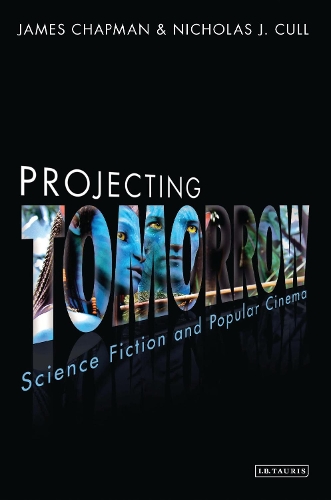
Projecting Tomorrow: Science Fiction and Popular Cinema
Publishing Details
Projecting Tomorrow: Science Fiction and Popular Cinema
By (Author) Prof James Chapman
By (author) Nicholas J. Cull
Bloomsbury Publishing PLC
I.B. Tauris
18th December 2012
United Kingdom
Classifications
General
Non Fiction
Popular culture
791.43615
Physical Properties
256
Width 154mm, Height 228mm, Spine 22mm
460g
Description
Cinema and science fiction were made for each other. Science fiction has been at the cutting edge of film technology and the genre has produced some of the most ambitious, imaginative and visually spectacular films ever made. Yet science fiction cinema is about more than just state-of-the-art special effects. It has also provided a vehicle for film-makers and writers to comment on their own societies and cultures. In this new study of the genre, James Chapman and Nicholas Cull examine a series of landmark science fiction films from the 1930s to the present. They include genre classics, including 'Things to Come', 'Forbidden Planet', 'Planet of the Apes' and '2001: A Space Odyssey', alongside modern blockbusters 'Star Wars' and 'Avatar'. They consider both screen originals and adaptations of the work of major science fiction authors such as H.G. Wells and Arthur C. Clarke. They range widely across the genre from pulp adventure and space opera to political allegory and speculative documentary- there is even a science fiction musical.
Chapman and Cull explore the contexts and document the production histories of each film to show how they made their way to the screen- and why they turned out the way they did. Informed throughout by extensive original research in US and British archives, Projecting Tomorrow will be essential reading for all students and fans of science fiction cinema.
Reviews
'I very much enjoyed the background that Chapman and Cull produced on these films. I managed to learn something new in every chapter. The authors did a masterful job in the selection of examples- a mix of the essential and the surprising- which nevertheless manage to cover many of the key periods in the genre's evolution on the screen. They make a strong case for why SF films need to be considered in their own right, and not simply as an extension of the literary version of the genre. All told, I suspect this book is going to be well received by fans and academics alike.' Henry Jenkins, co-author, Spreadable Media: Creating Value and Meaning in a Networked Culture.
Author Bio
James Chapman is Professor of Film Studies at the University of Leicester, UK. His previous books include The British at War: Cinema, State and Propaganda, 1939-1945(1998), and Licence To Thrill: A Cultural History of the James Bond Films (2nd edn 2007), both from I.B.Tauris. He is editor of the Historical Journal of Film, Radio and Television. Nicholas J. Cull is Professor of Public Diplomacy in the Annenberg School for Communication and Journalism at the University of Southern California in Los Angeles. His previous books include The Cold War and the United States Information Agency: American Propaganda and Public Diplomacy, 1945-1989(2008) and (with James Chapman), Projecting Empire: Imperialism and Popular Cinema (I.B.Tauris, 2009). He is president of the International Association for Media and History.
